
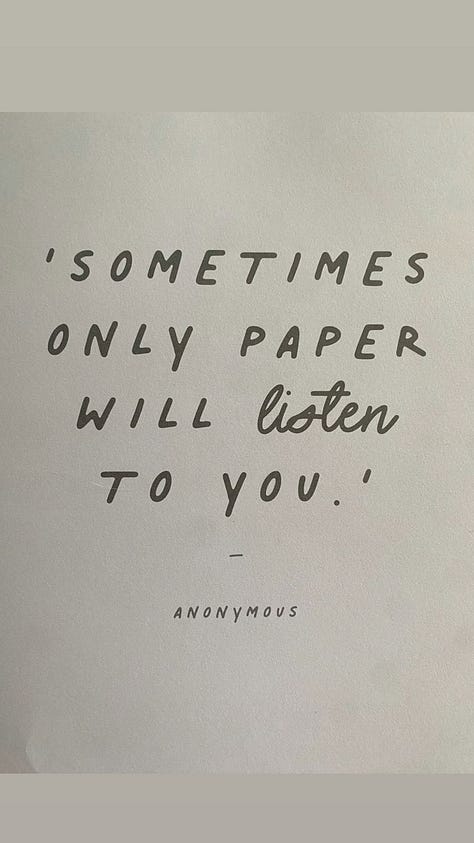
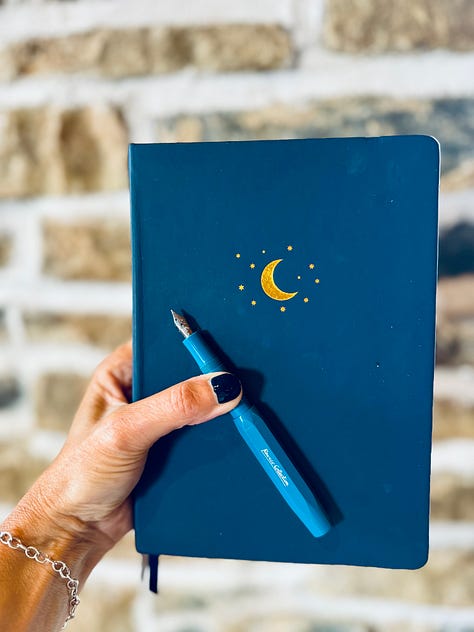
Dear Friend
How are you feeling today? I hope you’re well. And hello if you’re a new subscriber, it’s so lovely to be connected. Since being featured in Conde Nast Traveller magazine this week, I’ve had a flurry of new readers, which always makes me smile.
Today I’m hosting a in-person journalling workshop at The Big Retreat Festival, so please forgive me for re-posting one of my popular essays from last year. You’ll hopefully enjoy it, especially if you’re new to journalling, or struggle to keep a consistent practice.
Here’s the thing…
There is no right way to journal.
I know this only too well.
I’ve spent years trying to master it.
It’s a life long practice, and I’ll be a student to the practice until the day I die. I love learning about all the ancient and the latest therapeutic journalling techniques. I learn something new each day and I love to share my findings with you. As you may well know if you’ve been reading my Substack for a few months, that I have a life long mission - to help as many people, particularly women make journalling a non-negotiable daily ritual.
If you’re up for it, I’d like to take you through the basics of how to commit to a daily journalling habit, and hopefully you’ll decide to add it to your wellbeing toolbox.
I passionately believe that any form of journalling can be beneficial for improved health and wellbeing, but therapeutic journalling is on another level and it encompasses a huge spectrum of techniques, including:
2 minute journalling sprints
One word a day, one day at a time
Sentence stems
Structured writing sessions
Lists of 100
Mindmaps
Unsent Letters
Poetry
Visual sketches
Framing the day
Free Writing
…and the list goes on!
Lots of people ask me what’s so good about journalling daily and how can it boost health and wellbeing?
I’ll let you into a little secret. Journalling isn’t rocket science and it’s not expensive. Everybody hopefully has access to a piece of paper, a pen or pencil. But to reap the rewards from therapeutic journalling, consistency is key if all you write is one word, one day at a time.
Just like going to a yoga class to learn about the practice of yoga, learning how to practice therapeutic journalling can take a lifetime to fine tune. But the good news is that foundational journalling can be done anywhere at anytime with very little effort. It is one of the most beneficial wellbeing practices you could gift yourself. Oh and it’s never too late to start journalling! I know lots of 70 year olds that have started journalling for the first time and love it!
The simple act of writing down our thoughts and feelings can help us prioritise our problems and manage any intrusive thoughts throughout the day. As well as help us monitor our day to day mental health over long periods of time.

Here are just some of the health & wellbeing benefits:
Alleviates depression and anxiety
Reduces stress
Improves self- esteem
Pushes past procrastination
Helps you find your true self
Unlocks mindfulness
It’s food for the soul
Unblocks creativity
Improves our immune system (Check out research by Dr James W Pennebaker discussed on the Huberman Lab podcast). It’s fascinating and many of my “Rage on a Page” students have had profound and life changing experiences from working through this journalling protocol.
So maybe you’re wondering if therapeutic journalling is for you?
My advice, don’t overthink it, just start!
Pick up a pen and give it a try. Or tap away at the keyboard. What ever suits you best. Although I’d suggest you stay away from your digital devices if at all possible. Writing with a pen or pencil onto the page engages your brain better, it actually increases activity in the brain’s motor cortex, an effect that’s similar to meditation. Plus, it forces you to slow down.
Talking from experience, it’s very important to give yourself permission to journal scrappy. Why not try journalling for just a minute about anything you feel like writing about. If you find this too challenging. Commit to writing just one word a day, one day at a time. Don’t overthink the word, but if you do feel like delving deeper about the word of choice, write for 2 minutes about what the word means to you, describing why you selected it and where does the word show up in your life. Try not to second guess yourself or edit what you write. With this basic journalling exercise, I’m encouraging you to get into the habit of making time to sit with your journal for a few minutes once a day.
One thing to bare-in mind, is that it’s very important to be aware of your inner critic. If you can, try and silence it. One way of doing this, is to write with your non dominant hand. I know this isn’t easy, but it’s one way of preventing your inner critic from taking over your journaling practice.
I’ll reiterate this again - there are NO RULES - journalling is meant to be a calming, safe and liberating experience. I’ve journaled for years, but consistently for over 1200 days, I can’t go a day without journaling. It’s literally my oxygen.
I journal so I can make sense of my thoughts.
Journalling isn’t for everyone, so please don’t be hard on yourself if you don’t manage to commit to a daily habit just yet. All I’d say is that if you do try and journal for the next few days, even for the month of June, you have nothing to lose and everything to gain, especially when it comes to making yourself a priority and looking after your own self care.
Do let me know if you’d like more information about any of the above journalling techniques and don’t forget if you become a paid subscriber to my Substack you get free access to my weekly online “Journal with Ease” club. If you’re curious about how other writers journal, you might enjoy “The Book of Alchemy” by Suleika Jaouad, it’s a keeper!
Until the next time
Take care and stay safe xx

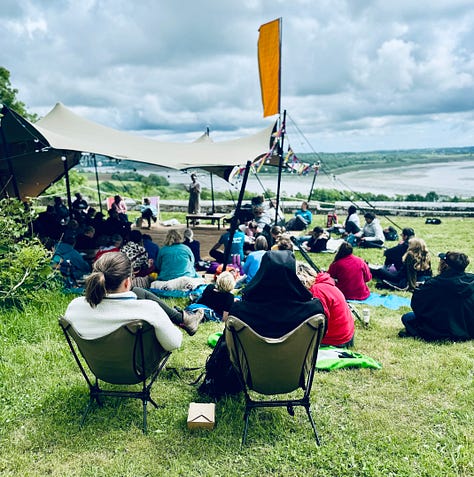
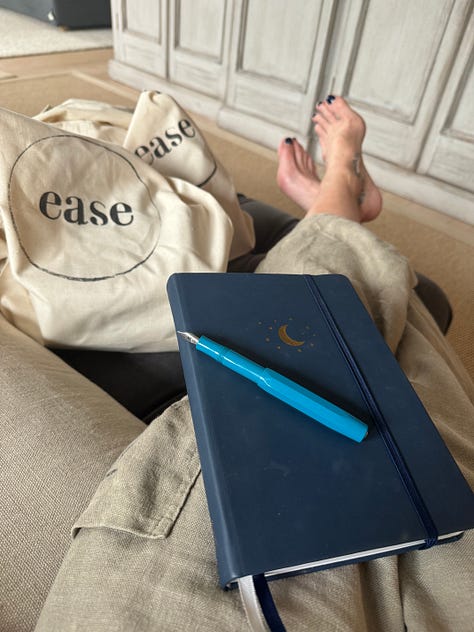
About me… I’m Tanya Lynch, a mother, a ridgeback owner and the founder of Ease Retreats. I love what I do, collaborating with authors and creatives, hosting retreats in beautiful venues across the UK. I’m also a therapeutic journaling coach and through my program Rage on a Page, I help midlife women channel their emotions into something more positive and creative in less than 60 days. Each Thursday I host an online journaling club called Journal with Ease and it’s free for paid subscribers to attend. If you have any questions about the benefits of therapeutic journaling, please reach out and connect. I’m usually on a beach walking the dogs, hosting retreats or hanging out here on Substack.





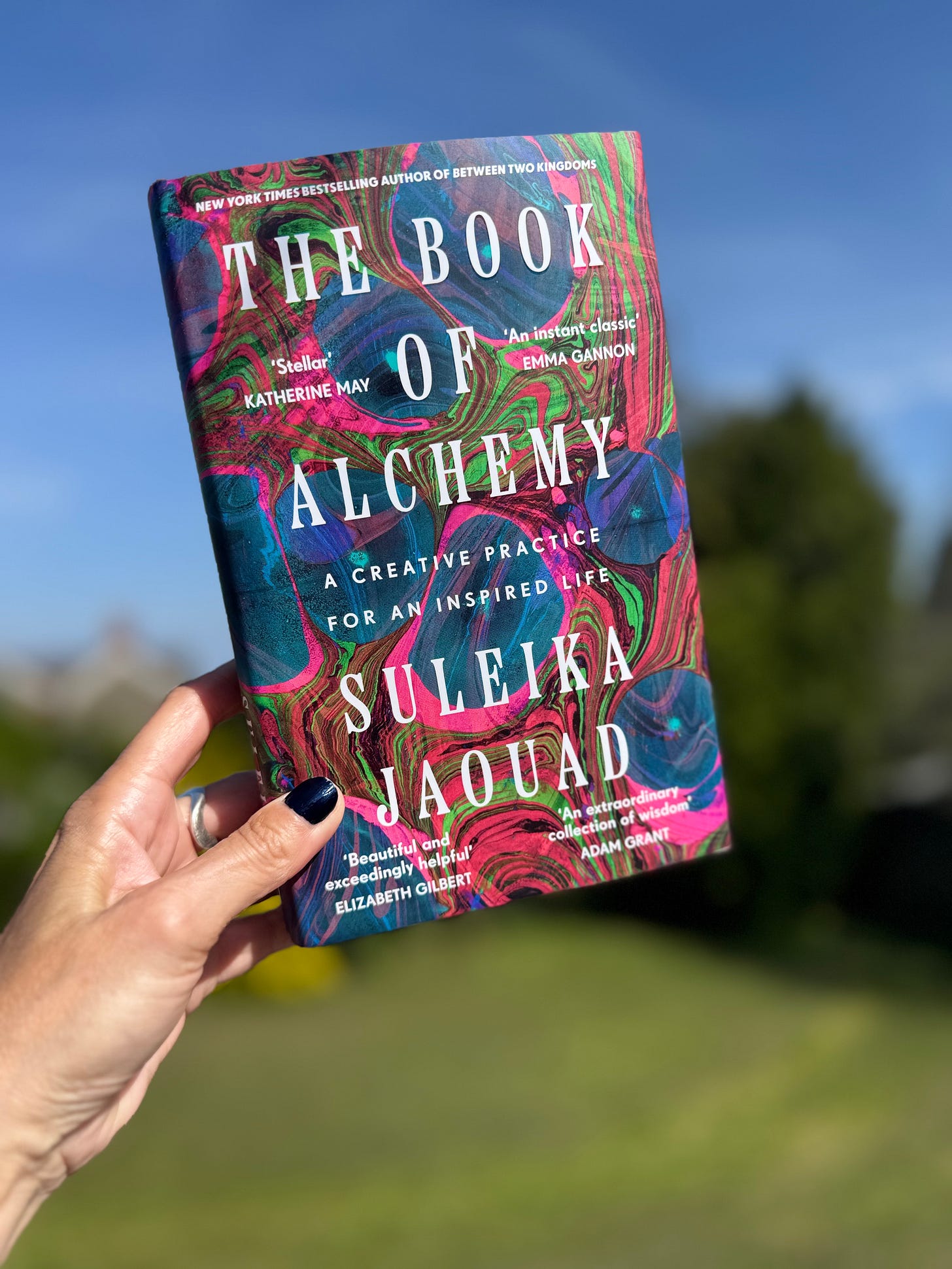
Tanya, this was a delightful read. Thank you 🙏